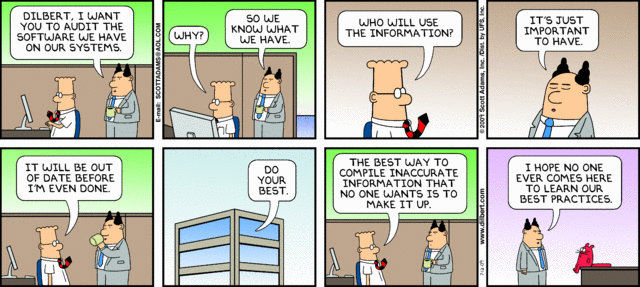Like many geeks, I love Dilbert. However, I rarely identify with it as well as I did Sunday.
I kid you not, I’ve had almost exactly this conversation back when I worked in MS IT. They have this big repository of information about deployed applications. Technically, you’re not supposed to deploy an application without listing it in the application repository. Like Dilbert, I never really understood what people were going to do with this information, but the projects I was on dutifully collected the relevant information and put it into the repository.
And never thought of it again. Ever.
And therein lies the problem. Populating the application repository was an artificial step on the critical path of the deployment process. Writing the software, acquiring the physical hardware to run it on, stuff like that really is on the critical path. Populating the application repository was extra busy work legislated by someone (I forget if it was the central architecture team or management) that didn’t benefit the project in the slightest. As such, it was given the minimal about of attention and effort, meaning there was little quality or consistency in the data. Worse yet, when the application changed or was decommissioned , updating the application repository just didn’t happen. I mean, it was supposed to, but rarely did.
So you ended up with a repository of information that was worse than useless. I had a colleague who insisted that the repository had some value because “not all of the data was wrong”. Of course, he couldn’t tell me with any consistency which data was accurate and therefore valuable and which was not. Hence, my argument that it was “worse than useless”.
The only way an application repository is going to be of any value at all is if you can collect the data automatically. My old teammate Buzz coined a phrase we used often: “The Truth Is On The Edge”. You should always regard any central repository of information with a very critical eye since it’s rarely going to be the truth.
(Ed. Note – Man, it’s been a long time since I’ve written about Architecture. My last Architecture post was almost a year ago. I don’t miss the job but I do miss my old teammates – in particular Buzz, Rick, Dale and of course Nick Malik.)

Comments: